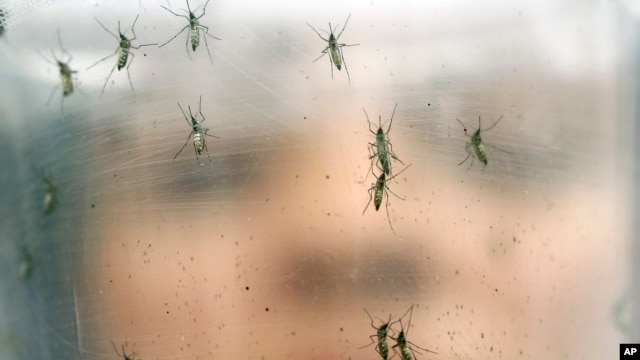July 07, 2016 1:15 PM
GENEVA—
“This is not like Ebola or not like Zika, for which we do not have a vaccine, of course. This is a disease for which we have a vaccine and for which there is a vaccination requirement under the International Health Regulations for yellow fever," he said. "So, again a big part of our work with the countries at risk of the disease is to ensure that they have a vaccination of traveler policy.”
The World Health Organization is leading a mass yellow fever vaccination campaign in central Africa to prevent the national and international spread of this deadly disease. The campaign, which begins this month, aims to vaccinate 15.5 million people in Angola and the Democratic Republic of Congo.
A yellow fever outbreak began late last year in the Angolan capital, Luanda and spread quickly throughout the country. The disease also spread to neighboring Democratic Republic of Congo.
The two-month vaccination campaign is being held in advance of the next rainy season in September, when mosquitos come out and transmission goes up.
Bruce Aylward is WHO executive director of Outbreaks and Health Emergencies. He says this outbreak is particularly dangerous because it is occurring in large cities.
He says massive outbreaks of yellow fever can occur in urban settings because mosquitos can rapidly infect thousands of people.
“With that explosive spread and the number of cases, you can see very high mortality rates," he said. "These can be very dangerous, destabilizing events; but, the other concern is when urban outbreaks take off in these areas, there is a risk then of international spread of this virus.”
Aylward says two cases were reported in Kenya and 11 cases were brought to China by Chinese men who had been working in Angola. Yellow fever is endemic in 47 countries, 33 of them in Africa. Most of the rest are in South America.
A yellow fever outbreak began late last year in the Angolan capital, Luanda and spread quickly throughout the country. The disease also spread to neighboring Democratic Republic of Congo.
The two-month vaccination campaign is being held in advance of the next rainy season in September, when mosquitos come out and transmission goes up.
Bruce Aylward is WHO executive director of Outbreaks and Health Emergencies. He says this outbreak is particularly dangerous because it is occurring in large cities.
He says massive outbreaks of yellow fever can occur in urban settings because mosquitos can rapidly infect thousands of people.
“With that explosive spread and the number of cases, you can see very high mortality rates," he said. "These can be very dangerous, destabilizing events; but, the other concern is when urban outbreaks take off in these areas, there is a risk then of international spread of this virus.”
Aylward says two cases were reported in Kenya and 11 cases were brought to China by Chinese men who had been working in Angola. Yellow fever is endemic in 47 countries, 33 of them in Africa. Most of the rest are in South America.
FILE - A researcher holds a container of female Aedes aegypti mosquitoes at the Biomedical Sciences Institute at Sao Paulo University in Brazil.
Yellow fever is an acute viral disease that in the worst cases, can cause liver damage that begins to turn the skin yellow. The mosquito that transmits the virus is the Aedes Aegypti, the same one that transmits the Zika virus. Since the mosquito also exists in Asia, Aylward warns the potential for creating an international crisis exists.
Aylward, however, tells VOA the prognosis for containing the geographical spread is good.
Aylward, however, tells VOA the prognosis for containing the geographical spread is good.
“This is not like Ebola or not like Zika, for which we do not have a vaccine, of course. This is a disease for which we have a vaccine and for which there is a vaccination requirement under the International Health Regulations for yellow fever," he said. "So, again a big part of our work with the countries at risk of the disease is to ensure that they have a vaccination of traveler policy.”
Latest WHO figures show more than 3,500 suspected and over 860 confirmed cases of yellow fever in Angola, with 355 deaths. In DRC, there are over 1,300 suspected and 68 confirmed cases, with 75 deaths.
The cost of the mass yellow fever campaign is expected to be $34 million.
The cost of the mass yellow fever campaign is expected to be $34 million.
Aylward says the WHO will launch an appeal for $20 million in the coming days, with Angola and DRC covering the rest.


No comments:
Post a Comment